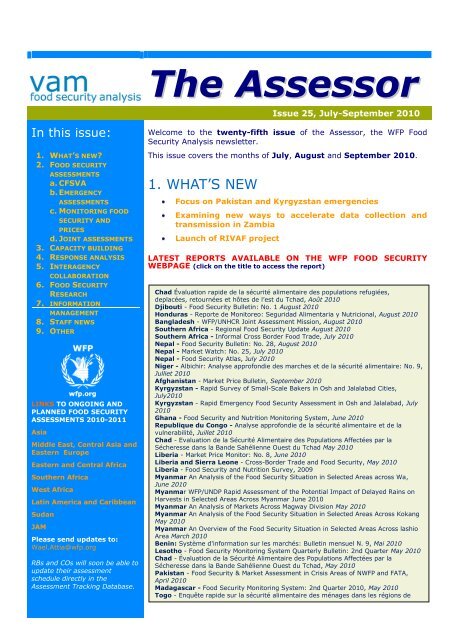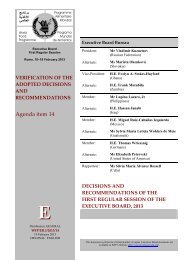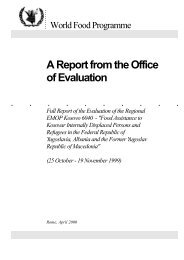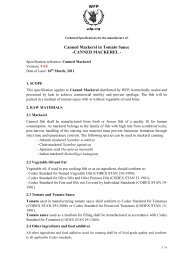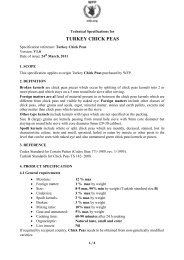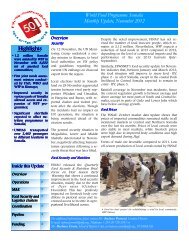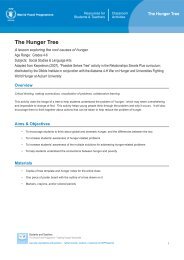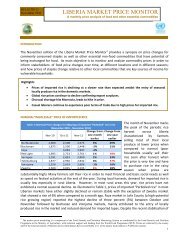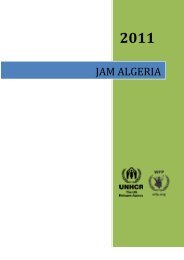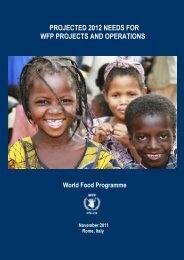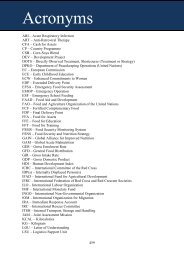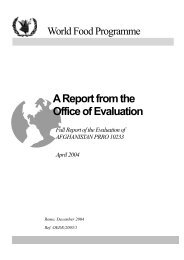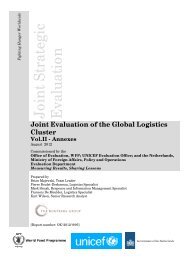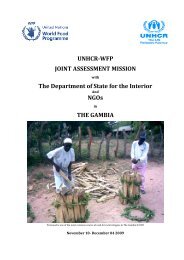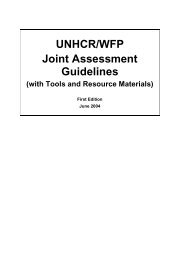The Assessor - WFP Remote Access Secure Services
The Assessor - WFP Remote Access Secure Services
The Assessor - WFP Remote Access Secure Services
You also want an ePaper? Increase the reach of your titles
YUMPU automatically turns print PDFs into web optimized ePapers that Google loves.
In this issue:<br />
1. WHAT’S NEW?<br />
2. FOOD SECURITY<br />
ASSESSMENTS<br />
a. CFSVA<br />
b. EMERGENCY<br />
ASSESSMENTS<br />
c. MONITORING FOOD<br />
SECURITY AND<br />
PRICES<br />
d. JOINT ASSESSMENTS<br />
3. CAPACITY BUILDING<br />
4. RESPONSE ANALYSIS<br />
5. INTERAGENCY<br />
COLLABORATION<br />
6. FOOD SECURITY<br />
RESEARCH<br />
7. INFORMATION<br />
MANAGEMENT<br />
8. STAFF NEWS<br />
9. OTHER<br />
LINKS TO ONGOING AND<br />
PLANNED FOOD SECURITY<br />
ASSESSMENTS 2010-2011<br />
Asia<br />
Middle East, Central Asia and<br />
Eastern Europe<br />
Eastern and Central Africa<br />
Southern Africa<br />
West Africa<br />
Latin America and Caribbean<br />
Sudan<br />
JAM<br />
Please send updates to:<br />
Wael.Attia@wfp.org<br />
RBs and COs will soon be able to<br />
update their assessment<br />
schedule directly in the<br />
Assessment Tracking Database.<br />
<strong>The</strong> <strong>Assessor</strong><br />
Issue 25, July-September 2010<br />
Welcome to the twenty-fifth issue of the <strong>Assessor</strong>, the <strong>WFP</strong> Food<br />
Security Analysis newsletter.<br />
This issue covers the months of July, August and September 2010.<br />
1. WHAT’S NEW<br />
Focus on Pakistan and Kyrgyzstan emergencies<br />
Examining new ways to accelerate data collection and<br />
transmission in Zambia<br />
Launch of RIVAF project<br />
LATEST REPORTS AVAILABLE ON THE <strong>WFP</strong> FOOD SECURITY<br />
WEBPAGE (click on the title to access the report)<br />
Chad Évaluation rapide de la sécurité alimentaire des populations refugiées,<br />
deplacées, retournées et hôtes de l’est du Tchad, Août 2010<br />
Djibouti - Food Security Bulletin: No. 1 August 2010<br />
Honduras - Reporte de Monitoreo: Seguridad Alimentaria y Nutricional, August 2010<br />
Bangladesh - <strong>WFP</strong>/UNHCR Joint Assessment Mission, August 2010<br />
Southern Africa - Regional Food Security Update August 2010<br />
Southern Africa - Informal Cross Border Food Trade, July 2010<br />
Nepal - Food Security Bulletin: No. 28, August 2010<br />
Nepal - Market Watch: No. 25, July 2010<br />
Nepal - Food Security Atlas, July 2010<br />
Niger - Albichir: Analyse approfondie des marches et de la sécurité alimentaire: No. 9,<br />
Julliet 2010<br />
Afghanistan - Market Price Bulletin, September 2010<br />
Kyrgyzstan - Rapid Survey of Small-Scale Bakers in Osh and Jalalabad Cities,<br />
July2010<br />
Kyrgyzstan - Rapid Emergency Food Security Assessment in Osh and Jalalabad, July<br />
2010<br />
Ghana - Food Security and Nutrition Monitoring System, June 2010<br />
Republique du Congo - Analyse approfondie de la sécurité alimentaire et de la<br />
vulnerabilité, Juillet 2010<br />
Chad - Evaluation de la Sécurité Alimentaire des Populations Affectées par la<br />
Sécheresse dans la Bande Sahélienne Ouest du Tchad May 2010<br />
Liberia - Market Price Monitor: No. 8, June 2010<br />
Liberia and Sierra Leone - Cross-Border Trade and Food Security, May 2010<br />
Liberia - Food Security and Nutrition Survey, 2009<br />
Myanmar An Analysis of the Food Security Situation in Selected Areas across Wa,<br />
June 2010<br />
Myanmar <strong>WFP</strong>/UNDP Rapid Assessment of the Potential Impact of Delayed Rains on<br />
Harvests in Selected Areas Across Myanmar June 2010<br />
Myanmar An Analysis of Markets Across Magway Division May 2010<br />
Myanmar An Analysis of the Food Security Situation in Selected Areas Across Kokang<br />
May 2010<br />
Myanmar An Overview of the Food Security Situation in Selected Areas Across lashio<br />
Area March 2010<br />
Benin: Système d'information sur les marchés: Bulletin mensuel N. 9, Mai 2010<br />
Lesotho - Food Security Monitoring System Quarterly Bulletin: 2nd Quarter May 2010<br />
Chad - Évaluation de la Sécurité Alimentaire des Populations Affectées par la<br />
Sécheresse dans la Bande Sahélienne Ouest du Tchad, May 2010<br />
Pakistan - Food Security & Market Assessment in Crisis Areas of N<strong>WFP</strong> and FATA,<br />
April 2010<br />
Madagascar - Food Security Monitoring System: 2nd Quarter 2010, May 2010<br />
Togo - Enquête rapide sur la sécurité alimentaire des ménages dans les régions de<br />
Savanes et de la Kara Avril 2010
CLICK HERE FOR THE LATEST<br />
CFSVA REPORTS AVAILABLE<br />
Contact:<br />
Siemon.Hollema@wfp.org<br />
Claudia.AhPoe@wfp.org<br />
Chiara.Brunelli@wfp.org<br />
Cinzia.Papavero@wfp.org<br />
Click here for a List of<br />
completed, ongoing and<br />
upcoming Comprehensive<br />
Food Security and<br />
Vulnerability Analyses<br />
(CFSVA) for 2009 and 2010.<br />
CLICK HERE FOR THE LATEST<br />
EFSA REPORTS AVAILABLE<br />
Contact:<br />
Siemon.Hollema@wfp.org<br />
Contact:<br />
Issa.Sanogo@wfp.org and<br />
Cheng.Fang@fao.org<br />
Contact:<br />
Agnes.Dhur@wfp.org<br />
2<br />
2. FOOD SECURITY ASSESSMENTS<br />
a. Comprehensive Food Security and<br />
Vulnerability Analysis (CFSVA)<br />
Republic of Congo, CAR, Chad and Bangladesh reports have been<br />
recently posted on the Food Security Analysis website.<br />
CFSVA reports for Armenia, Tanzania and Dominican Republic are<br />
under finalization.<br />
Survey implementation is ongoing in Senegal, Liberia, Sierra Leone,<br />
Kenya (urban), Madagascar, and China. Analysis is under way in<br />
Zambia.<br />
In Malawi, Ethiopia, Nepal, Niger, Nigeria and Sudan efforts are<br />
ongoing to incorporate <strong>WFP</strong> corporate food security and vulnerability<br />
indicators in national household surveys, in close cooperation with the<br />
World Bank. In September, Statistics Norway is seconding a staff<br />
member to work with ODXF on food security analysis methodology in<br />
the context of national household surveys.<br />
b. Emergency food security<br />
assessments<br />
Pakistan An assessment was carried out in the immediate aftermaths<br />
of the flood to quantify the extent of damage and displacement, and<br />
their immediate impact on household assets, livelihoods, food<br />
consumption and nutrition<br />
It identified at least 14.1 million people who were directly affected<br />
across the country. More than 1.1 million houses were completely<br />
destroyed or made unihabitatble and more than 2 million hectares of<br />
standing crops were damaged or lost.<br />
About 10.1 million people are in need of immediate assistance.<br />
<strong>The</strong> joint <strong>WFP</strong>/FAO modelling team is contributing to the ADB-World<br />
Bank Damage and Needs Assessment through the application of an<br />
economic model - based on nationwide households’ survey data for<br />
Pakistan - designed to assess the impact of potential and actual shocks<br />
on income, expenditures and food consumption at the household level,<br />
for key population groups.<br />
Kyrgyzstan A Rapid EFSA to assess the situation of IDPs and<br />
residents affected by violent civil conflict last June in Osh and Jalalabad<br />
regions was completed mid-July. Results were used by <strong>WFP</strong> to fine-tune<br />
its targeting criteria and caseload of beneficiaries. A Rapid survey of<br />
small-scale bakers was also completed at the same time to identify the<br />
main factors hampering small-bakers activities in conflict-affected<br />
areas, and identify opportunities for assistance. A follow-up EFSA in Osh<br />
and Jalalabad is planned for October 2010.<br />
A nation-wide EFSA was carried out at the end of July and the report<br />
is being finalized. Its results will be used to (i) review <strong>WFP</strong> regular<br />
assistance programme in terms of geographical and household<br />
targeting, (ii) select a pilot region to establish a sentinel-based Food<br />
Security Monitoring System, and (iii) feed into the joint FAO/<strong>WFP</strong> Crop<br />
and Food Security Assessment which took place simultaneously.
Contact:<br />
Rossella.Bottone@wfp.org or<br />
Hector.Roca@wfp.org<br />
Contact:<br />
Asif.Niazi@wfp.org or<br />
Silvana.Giuffrida@wfp.org<br />
Click here for the latest Global<br />
Monitoring Update<br />
Contact:<br />
Wanja.Kaaria@wfp.org<br />
SADC VAC Reports for<br />
Southern Africa and updates are<br />
available here<br />
Contact:<br />
Margaretha.Barkhof@wfp.org<br />
Contact:<br />
Oscar.Antenzana@wfp.org or<br />
Ceren.Gurkan@wfp.org<br />
Contact:<br />
Nusha.Choudhury@wfp.org or<br />
Francesco.Slaviero@wfp.org;<br />
Contact:<br />
Yvonne.Forsen@wfp.org<br />
Contact:<br />
Eric.Kenefick@wfp.org<br />
Contact:<br />
Ceren.Gurkan@wfp.org<br />
Click here for the latest Market<br />
Monitor<br />
Contact:<br />
Issa.Sanogo@wfp.org<br />
Guatemala an in-depth EFSA was carried out in July to assess the<br />
impact of Tropical Storm Agatha and plan interventions for the coming<br />
semester. <strong>The</strong> final report is under finalization and will be released in<br />
September.<br />
Syria An EFSA is being prepared for drought prone areas in the Northeastern<br />
part of the country. Preparatory discussions are taking place in<br />
September; field work is planned for October<br />
c. Monitoring food security and prices<br />
<strong>The</strong> latest Global Monitoring Update for the period January-June<br />
2010 is now available online. <strong>The</strong> update will be released on a biannual<br />
basis.<br />
Honduras and Djibouti have started releasing FSMS quarterly<br />
bulletins. In Honduras, information is routinely collected from selected<br />
sites jointly with the Government and two bulletins were published<br />
insofar. In both countries, efforts are ongoing to develop government<br />
capacity to implement FSMS.<br />
A one day FSMS sub-regional technical consultation was held in El<br />
Salvador in June with the participation of <strong>WFP</strong> staff from El Salvador,<br />
Honduras and Nicaragua Country Offices as well as the Regional Bureau<br />
for Latin American and the Caribbean.<br />
An FSMS and Markets mission took place in Bolivia in August. It<br />
provided support to guide methodological design of the market<br />
assessment in two municipalities and to the identification of potential<br />
sentinel sites.<br />
An FSMS mission to Bangladesh is planned for September, with the<br />
purpose of supporting the country office in the identification of key<br />
indicators for food security monitoring and providing on the job training<br />
for two VAM officers on secondary data collection/collation, analysis and<br />
reporting.<br />
Sudan FSMS rounds were carried out in selected states in Eastern and<br />
Southern Sudan in July and in Northern, Western and Southern Darfur<br />
in August.<br />
<strong>The</strong> July 2010 Bulletin of the Southern Africa Informal Cross-border<br />
Food Trade project (<strong>WFP</strong>/FEWSNet) is available online.<br />
<strong>The</strong> final report of the Market study in Yemen will be released in<br />
September.<br />
Market Monitor <strong>The</strong> eighth issue of the quarterly bulletin-covering 61<br />
countries- was released in July. For the first time, the bulletin examined<br />
fuel price and CPI (Consumers Price Index) along with food price trends<br />
and the terms of trade. <strong>The</strong> bulletin highlighted stable or decreasing<br />
food prices from the previous quarter, though, for most countries, prices<br />
and the overall cost of the food basket remained significantly high<br />
compared to the seasonal patterns before the 2008 price crisis. In<br />
particular, it reported an upward inflation and a deterioration of the<br />
purchasing power of pastoralist communities in Niger, Kenya and<br />
Sudan. <strong>The</strong> next bulletin will be released at the end of September 2010.<br />
3
CLICK HERE FOR THE LATEST<br />
JAM REPORTS AVAILABLE<br />
Contact:<br />
Kathryn.Ogden@wfp.org<br />
Michael.Dunford@wfp.org<br />
Contact:<br />
Joyce.Luma@wfp.org<br />
UPCOMING TRAINING<br />
ACTIVITIES:<br />
13-17 September, Bangkok ,<br />
Price Analysis training<br />
Contact:<br />
Simon.Dradri@wfp.org or<br />
Issa.Sanogo@wfp.org<br />
20-24 September,<br />
Guatemala, Initial EFSA<br />
training<br />
Contact:<br />
Marcela.Mayorga@wfp.org or<br />
Margaretha.Barkhof@wfp.org<br />
26-30 September Aleppo<br />
Syria EFSA training<br />
Contact:<br />
Asif.Niazi@wfp.org<br />
Contact:<br />
Alexis.Hoskins@wfp.org or<br />
Wael.Attia@wfp.org<br />
Contact:<br />
Mario.Musa@wfp.org<br />
Contact:<br />
Valerie.Ceylon@wfp.org or<br />
Simon.Renk@wfp.org<br />
Contact:<br />
Agnes.Dhur@wfp.org<br />
4<br />
d. Joint assessments<br />
Joint Assessment Missions (JAM)<br />
Bangladesh the follow-up UNHCR-<strong>WFP</strong> JAM on the Rohingya refugees<br />
report is now available.<br />
Crop and Food Security Assessment Missions (CFSAM)<br />
Preparation is underway for the CFSAM in DPRK, to take place end of<br />
September-beginning of October.<br />
Zimbabwe and Mozambique CFSAM reports were released in August<br />
and posted on GIEWS. Madagascar and Haiti reports are under<br />
finalization.<br />
3. CAPACITY BUILDING<br />
Enhanced Capacity in Food Security and Response Analysis<br />
(ENCAP)<br />
Recent training courses held: During June and July, two initial EFSA<br />
trainings were held in Pakistan and Madagascar, and an intermediate<br />
training on quantitative data analysis was held in Rome.<br />
Contact:<br />
Simon.Dradri@wfp.org, Maherisoa.Rakotonirainy@wfp.org or<br />
Cinzia.Papavero@wfp.org, respectively<br />
An Integrated food security and nutrition analysis training for ODJ<br />
was conducted at end June/beginning July in Kampala.<br />
Contact:<br />
Eric.Kenefick@wfp.org or Kathryn.Ogden@wfp.org<br />
<strong>Assessor</strong>s Database <strong>The</strong> revamped <strong>Assessor</strong>s Database will be tested<br />
on a rolling basis, beginning with the ODJ region in September. This<br />
system will facilitate tracking of, and searching for, experienced food<br />
security analysts and trainers based on their previous assessment and<br />
training experience.<br />
<strong>The</strong> first Online technical writing course (in English), specifically<br />
tailored to the reporting needs of <strong>WFP</strong> Food Security analysts, will be<br />
run between September and December 2010.<br />
4. RESPONSE ANALYSIS<br />
Somalia On 23-24 August, <strong>WFP</strong> took part in a workshop held by FAO<br />
Somalia, to pilot a joint response analysis process based on post-gu<br />
situation analysis. Lessons will be learned by the end of December of<br />
the Somalia pilot experience.<br />
5. INTERAGENCY COLLABORATION<br />
IASC Needs Assessment Task Force (NATF) <strong>The</strong> draft operational<br />
guidance for joint needs assessment was circulated to NATF member<br />
agencies for feedback. A final draft for larger audience should be<br />
distributed for further comments in September/October.<br />
Two field-tests of the Humanitarian Dashboard (re-named Humanitarian<br />
Country Team tool) were conducted in Somalia and in the occupied
Contact:<br />
Sylvie.Montembault@wfp.org<br />
Link to the Nutrition cluster<br />
website<br />
Contact:<br />
Kathryn.Ogden@wfp.org<br />
Contact:<br />
Issa.Sanogo@wfp.org<br />
Contact:<br />
Issa.Sanogo@wfp.org<br />
or Rossella.Bottone@wfp.org<br />
Contact:<br />
Eric.Kenefick@wfp.org<br />
or Mark.Gordon@wfp.org<br />
Contact:<br />
Asif.Niazi@wfp.org<br />
Contact:<br />
Thomas.Vasseur@wfp.org or<br />
Valerie.Ceylon@wfp.org<br />
Contact:<br />
Thomas.Vasseur@wfp.org or<br />
Cedric.Charpentier@wfp.org<br />
Palestine territories, the latter with participation of ODXF. Results will be<br />
used to review the lay-out and contents of the tool, for further<br />
circulation during the last quarter of the year. <strong>The</strong> NATF also completed<br />
a list of 'core' indicators by cluster/sector, including food security, and<br />
this will also be disseminated for comments to a broader audience. <strong>The</strong><br />
list of food security indicators was prepared by <strong>WFP</strong> and is meant to be<br />
shared with members of the soon to be established Global Food Security<br />
Cluster.<br />
Post-Conflict and Post-Disaster Needs Assessments (PCNA and<br />
PDNA)<br />
A draft guidance for Early Recovery Post-Conflict Needs Assessment was<br />
prepared by the Cluster Working Group for Early Recovery (CWGER)<br />
with peer review inputs from ODXF and other UN agencies.<br />
A lessons learned review of PDNAs is taking place, currently at UN interagency<br />
level and with later participation of the European Commission<br />
and the World Bank.<br />
Global Nutrition Cluster meeting (Geneva, 20-22 July) - ODXF<br />
presented the status of the food security cluster on behalf of the GFSC<br />
preparatory team (comprised of <strong>WFP</strong> and FAO) stressing the importance<br />
of collaboration with the global nutrition cluster and key areas of<br />
synergies/complementarities. It is foreseen that ODXF participation as<br />
members of the GNC will reduce when the food security cluster is fully<br />
established.<br />
IASC Task Force on Meeting Humanitarian Challenges in Urban<br />
Areas (MHCUA). Two case studies were completed by the task force in<br />
Nairobi and Manilla. ODXF provided inputs to the “zero draft” of the 5year<br />
Strategic Plan of the MHCUA. Key dates forthcoming are: 1) 02<br />
September, 2010: First Steering Group Meeting on the draft strategy, in<br />
Geneva; 2) September 23-24, Workshop on improving humanitarian<br />
response in urban areas, in Geneva; 3) November 10-12: IASC WG<br />
meetings in Rome.<br />
Urban Issues A review of urban assessment methods has been<br />
completed, as a joint collaboration between <strong>WFP</strong> and OXFAM. <strong>The</strong><br />
findings will be discussed in a technical meeting in Oxford from 4 to 5<br />
October 2010.<br />
A joint <strong>WFP</strong>-FAO Regional Seminar on Disaster Risk<br />
Reduction/Management will take place in Addis Ababa on 18-19<br />
October for the ODJ region.<br />
At the biannual UN-NGos MENA Group meeting held in July, ODC<br />
provided a briefing on the Atlas produced by UNISDR/<strong>WFP</strong>/ICARDA<br />
collaboration which identifies hotspot areas of MENA vulnerable to<br />
climate change.<br />
Integrated Food Security Phase Classification (IPC)<br />
<strong>The</strong> IPC Global Support Unit organized a two weeks Technical Retreat<br />
in Ispra, Northern Italy, in order to consult with technical experts and<br />
field practitioners on a series of key technical aspects in view of the<br />
elaboration of a version 2.0 of the IPC manual. A draft a new version is<br />
expected to be ready in December.<br />
ECHO, the main current donor to the IPC, led in July a monitoring<br />
mission of the IPC Eastern and Central African projects as well as<br />
of the Global IPC project.<br />
<strong>The</strong> missions were followed by a Global IPC Steering Committee<br />
5
Contact:<br />
Thomas.Vasseur@wfp.org<br />
Contact:<br />
Eric.Kenefick@wfp.org<br />
Contact:<br />
Issa.Sanogo@wfp.org and<br />
Cheng.Fang@fao.org<br />
Contact:<br />
Kathryn.Ogden@wfp.org<br />
Contact:<br />
Wahito.Kabaire@wfp.org<br />
or Kathryn.Ogden@wfp.org<br />
Contact:<br />
Eric.Kenefick@wfp.org<br />
Contact:<br />
Calum.McGregor@wfp.org<br />
George.Muammar@wfp.org<br />
or Wanja.Kaaria@wfp.org<br />
Click here for more info on the<br />
MDT system<br />
6<br />
meeting that endorsed a series of reforms for the IPC Global project<br />
following the ECHO Joint Monitoring Mission recommendations. <strong>The</strong>se<br />
reforms aim at increasing the Global Support Unit's capacity to IPC<br />
activities in the field.<br />
Philippines an IPC Pilot mission was organized in August, with the aim<br />
of promoting IPC with government and stakeholders. An IPC exercise<br />
was organized as an opportunity to experience the IPC set of protocols.<br />
In South Africa, the IPC is being implemented through the Department<br />
of Agriculture using the IPC seed money for southern Africa.<br />
A piloting of IPC took place in Zimbabwe in August.<br />
6. FOOD SECURITY RESEARCH<br />
Understanding the impact of shocks <strong>The</strong> second steering committee<br />
meeting was held in June to present progress. A technical seminar is<br />
planned in end-September at FAO to present preliminary findings of two<br />
country case studies (Malawi and Pakistan) and review the<br />
methodology. <strong>The</strong> concept note for a second phase is under preparation.<br />
Nutrition indicators in food security assessments. <strong>The</strong> final report<br />
on analysis of existing CFSVA databases is nearing completion.<br />
A study on food consumption and nutrition in Lesotho is completed.<br />
<strong>The</strong> final report is expected at end of September, with a second phase<br />
starting in October.<br />
<strong>The</strong> analysis of the Nutritional Assessment and Vulnerability<br />
Profiling of pre-ART (Anti Retroviral Treatment) and ART<br />
patients in Namibia has begun with preliminary findings presented at<br />
the end of September.<br />
7. INFORMATION MANAGEMENT<br />
VAM headquarters and Zambian country office are currently piloting a<br />
process of expediting data collection and transmission, based on<br />
the mobile delivery and tracking (MDT), which makes food rations<br />
delivery swifter and more cost-effective trough the use of scratch cards<br />
and mobile phones by beneficiaries and shopkeepers. <strong>The</strong> MDT database<br />
and web application will be adapted to allow for SMS-based capture and<br />
transmission of FSMS data, focusing Food Consumption, Coping<br />
Strategies and few other proxy indicators for food access.<br />
8. STAFF NEWS<br />
Jan Delbaere has left ODXF to take up his new assignment as Deputy<br />
Country Director in Rwanda.<br />
Arif Husain is the new Deputy Chief, ODXF.<br />
Siemon Hollema is the new Senior Programme Adviser for CFSVAs.<br />
Rossella Bottone has joined the Market Analysis team.<br />
Fabio Bedini and Jacqueline Frize have joined the RAP project team.<br />
<strong>The</strong>y will be working on, respectively, coordination issues and transfer<br />
modalities for Cash and Voucher programmes.<br />
Hazem Almahdy has joined the VAM unit in Sudan.<br />
Souleika Abdillahi has joined the IPC team as junior consultant.<br />
Astrid Mathiassen has joined the CFSVA team, seconded from<br />
Statistics Norway, to work on food security analysis methodology in the<br />
context of national household surveys.
Contact:<br />
Joyce.Luma@wfp.org,<br />
Micheal.Sheinkman@wfp.org or<br />
Eric.Kenefick@wfp.org<br />
Contact:<br />
Joyce.Luma@wfp org ,<br />
Arif.Husain@wfp.org or<br />
Mario.Musa@wfp.org<br />
Our website is updated daily.<br />
Check it out for more<br />
information!<br />
Otherwise, follow us on<br />
http://twitter.com/<strong>WFP</strong>VAM<br />
For questions, comments and<br />
suggestions contact:<br />
Mario.Musa@wfp.org<br />
If you do not wish to receive this<br />
newsletter, unsubscribe by<br />
sending an email with<br />
"Unsubscribe" in the subject line<br />
to:<br />
Mario.Musa@wfp.org<br />
or Wael.Attia@wfp.org<br />
NEXT ISSUE WILL BE RELEASED<br />
END OF OCTOBER/EARLY<br />
NOVEMBER 2010.<br />
In September, Sylvie Montembault is starting her new assignment at<br />
ODXF as Senior Programme Adviser for EFSAs.<br />
Joao Manja is leaving the Kenya CO and joining the Johannesburg<br />
team in October, replacing Sylvie.<br />
Agnès Dhur is starting a temporary assignment with the Programme<br />
Design Unit.<br />
Aurélie Larmoyer has left ODXF to take on a new position with FAO.<br />
9. OTHER<br />
Global Pulse ( formerly Global Impact and Vulnerability Alert<br />
System - GIVAS)<br />
UNICEF and <strong>WFP</strong> received support through the Rapid Impact and<br />
Vulnerability Analysis Fund (RIVAF) to examine how existing<br />
nutrition and food security data collected by the two agencies can best<br />
be triangulated in order to inform decision makers about the impact and<br />
changing vulnerabilities of households in response to global shocks such<br />
as the economic crisis. This will guide the development of a joint <strong>WFP</strong>-<br />
UNICEF monitoring initiative, feeding into the Global Impact<br />
Vulnerability Alert System (GIVAS), established by the UN Secretary<br />
General. Countries of focus are Indonesia, Madagascar, Malawi,<br />
Nepal and Zambia, all having being impacted by the global economic<br />
crisis.<br />
<strong>The</strong> project was officially launched on July 15. <strong>The</strong> lead consultant was<br />
appointed and the recruitment of national consultants is underway.<br />
Development of corporate and joint ISFS strategies<br />
In response to the 2008/2009 independent joint evaluation of FAO and<br />
<strong>WFP</strong> Information Systems for Food Security (ISFSs) both FAO and <strong>WFP</strong><br />
have worked on the development of their corporate ISFSs strategies<br />
Drafts of both strategies were submitted at the beginning of September<br />
and the review process is ongoing within the two organizations.<br />
<strong>The</strong> development of the Joint FAO/<strong>WFP</strong> ISFS will start in October. In this<br />
framework, early September both organizations participated in a<br />
symposium on Information Systems for Food Security (ISFS)<br />
hosted by the EC in Brussels. Discussions focused on needs and<br />
opportunities for capacity and institution building at national and<br />
regional levels and on the proposal for a global initiative for ISFS<br />
assistance coordination.<br />
7


